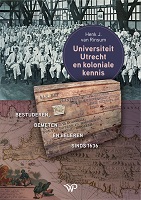Universiteit Utrecht en koloniale kennis
Bestuderen, bemeten en beleren sinds 1636
| dc.contributor.author | van Rinsum, Henk | |
| dc.date.accessioned | 2023-10-19T12:31:30Z | |
| dc.date.available | 2023-10-19T12:31:30Z | |
| dc.date.issued | 2023 | |
| dc.identifier | OCN: 1406069999 | |
| dc.identifier.uri | https://library.oapen.org/handle/20.500.12657/76879 | |
| dc.description.abstract | This book tells the story of Utrecht University’s colonial past. Ever since the university was founded in 1636, its scholars and students have been involved in various activities in the Dutch colonies of the West and East Indies. There was a great interest in the world of the 'other' far away: the natural world as well as their cultures, languages and religious systems. The basic assumption always was: we are 'developed', they are 'not yet developed'. Superiority served as guiding principle. By the end of the nineteenth century, Utrecht’s research activities in the colonies were dominated by biology, medicine, geology, and physical anthropology/anatomy. It was understood to be 'pure research' in the colonies. But it was pure colonial research. The University benefited enormously from those research activities. The latest phase of 'university development cooperation' (since the 1980s), was to some extent a continuation of that approach. | en_US |
| dc.language | Dutch | en_US |
| dc.subject.other | University, Colonialism, Development, Science, Superiority | en_US |
| dc.title | Universiteit Utrecht en koloniale kennis | en_US |
| dc.title.alternative | Bestuderen, bemeten en beleren sinds 1636 | en_US |
| dc.type | book | |
| oapen.identifier.doi | 10.5117/9789048562893 | en_US |
| oapen.relation.isPublishedBy | dd3d1a33-0ac2-4cfe-a101-355ae1bd857a | en_US |
| oapen.relation.isFundedBy | 626e72f0-c3c3-4cc5-8541-f623da772c05 | en_US |
| oapen.relation.isbn | 9789464562002 | en_US |
| oapen.imprint | Walburg Pers | en_US |
| oapen.pages | 354 | en_US |
| oapen.place.publication | Amsterdam | en_US |

